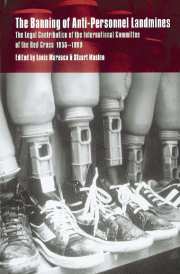 The Banning of Anti-Personnel Landmines
The Banning of Anti-Personnel Landmines Book contents
- Frontmatter
- Contents
- Foreword by Cornelio Sommaruga, President, International Committee of the Red Cross
- Foreword by Ambassador Jacob S. Selebi, South Africa
- Foreword by Ambassador Johan Molander, Sweden
- Introduction
- PART 1 FROM PRINCIPLES TO RULES: REGULATING MINES UP TO THE 1980 CONVENTION ON CERTAIN CONVENTIONAL WEAPONS
- PART 2 THE REVIEW CONFERENCE OF THE 1980 CONVENTION ON CERTAIN CONVENTIONAL WEAPONS: AN INITIAL RESPONSE TO THE LANDMINE CRISIS
- PART 3 THE OTTAWA PROCESS FROM REGIONAL INITIATIVES TO AN INTERNATIONAL PROHIBITION OF ANTI-PERSONNEL MINES
- Index
Introduction
Published online by Cambridge University Press: 03 December 2009
- Frontmatter
- Contents
- Foreword by Cornelio Sommaruga, President, International Committee of the Red Cross
- Foreword by Ambassador Jacob S. Selebi, South Africa
- Foreword by Ambassador Johan Molander, Sweden
- Introduction
- PART 1 FROM PRINCIPLES TO RULES: REGULATING MINES UP TO THE 1980 CONVENTION ON CERTAIN CONVENTIONAL WEAPONS
- PART 2 THE REVIEW CONFERENCE OF THE 1980 CONVENTION ON CERTAIN CONVENTIONAL WEAPONS: AN INITIAL RESPONSE TO THE LANDMINE CRISIS
- PART 3 THE OTTAWA PROCESS FROM REGIONAL INITIATIVES TO AN INTERNATIONAL PROHIBITION OF ANTI-PERSONNEL MINES
- Index
Summary
The International Committee of the Red Cross (ICRC) is perhaps best known for its work in the midst of armed conflict bringing aid and assistance to the injured and sick, prisoners of war and civilians affected by the fighting. Yet, the institution also has a long history of being closely involved in the development of international humanitarian law. It was the efforts of the founder of the ICRC, Henry Dunant, which led to the adoption of the first humanitarian law treaty, the 1864 Convention for the Amelioration of the Condition of the Wounded in Armies in the Field. Since that time the ICRC has continued to play an important role in the subsequent development of humanitarian law. It prepared the drafts which were the bases for the negotiations of the 1929 Geneva Convention on Prisoners of War, the four Geneva Conventions of 1949 and the Additional Protocols adopted in 1977.
The formal basis for the ICRC's role in this area is found in the Statute of the International Red Cross and Red Crescent Movement. This movement, which is comprised of the ICRC, National Red Cross and Red Crescent Societies and their International Federation, and which works closely with all States Parties to the Geneva Conventions of 1949, has charged the ICRC with the task of working ‘for the understanding and dissemination of knowledge of international humanitarian law applicable in armed conflicts and to prepare any development thereof’ (emphasis added). Thus, the ICRC's involvement in the development of a ban on anti-personnel landmines was neither a unique nor an unexpected action. It was part of a long tradition.
- Type
- Chapter
- Information
- The Banning of Anti-Personnel LandminesThe Legal Contribution of the International Committee of the Red Cross 1955–1999, pp. 1 - 4Publisher: Cambridge University PressPrint publication year: 2000


